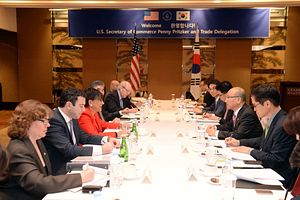From the moment that possibilities of a U.S. withdrawal from the North Atlantic Free Trade Agreement (NAFTA) were voiced on the presidential campaign trail last year, tensions spread far beyond Canada and Mexico about how Washington might change the global trading landscape. As the Trump administration now mulls over how it might renegotiate NAFTA, there is ever-growing concern that the White House will reassess or even scrap other deals too. Unlike NAFTA, however, which has been in place for over two decades and could potentially benefit from updates that would reflect changes in the global marketplace since then, there are fears that renegotiating or eliminating newer deals could do more harm than good across the board, not least for U.S. consumers.
South Korea is undoubtedly the non-member country most anxious about the outcome of NAFTA, given the threats its own bilateral deal with Washington is now facing. The U.S.-Korea bilateral free trade agreement (known as KORUS) came into effect in 2012 amid much fanfare, heralded as a gold standard for future trade deals. It was seen as particularly effective in addressing non-tariff barrier sector issues that have not been included in most trade agreements to date, including financial services and data processing. In fact, at first blush, KORUS should be exactly the kind of trade deal that Trump would support, as a bilateral deal that protects the future of the U.S. services sector.
Yet five years on, some numbers indicate that KORUS has not succeeded in reducing the U.S. trade deficit. In fact, the U.S. deficit in goods with South Korea continues despite the FTA, reaching $27.7 billion in 2016. As a result, Trump has repeatedly declared that KORUS is a “terrible deal… a deal that should have never been made.” He argued as recently as late April that the deal could either be renegotiated or terminated altogether.
On the other hand, the United States has actually seen a trade surplus in the services sector with South Korea, as it has with most other countries, to the tune of $10.7 billion last year. That surplus is in no small part due to the trade deal that has increased the allure of the Korean market to U.S. services providers by strengthening the protection of intellectual property rights, opening doors to U.S. legal services, allowing U.S. financial services providers to process data in the country, and opening up hitherto closed sectors such as the telecommunications industry.
Another upside to the bilateral FTA is the fact that more Korean companies have invested in the United States as a result. There are over 45,000 Americans now employed by Korean companies based in the United States, often for higher wages than their U.S. counterparts, which undoubtedly is in line with Trump’s own push for trade relations that would create more high-quality jobs for American workers.
Much has changed in the global economy since NAFTA came into force in 1994, not least the flourishing of online commerce. As a result, the trade deal between Canada, Mexico, and the United States could potentially benefit from updates that would reflect the needs of 21st century industries, especially in the services sector, which the United States dominates worldwide. In fact, the reasoning behind the Trans-Pacific Partnership (TPP) agreement had been that the higher standards set in the services sector by the new deal would supplant those established by NAFTA, and effectively eliminate the need to renegotiate NAFTA per se. In contrast, KORUS is a much more recent trade pact that has taken the needs of the internet economy into account, so there is no real need, from a bilateral perspective, for any significant renegotiation of the deal.
At the same time, Seoul finds itself at a particularly vulnerable time both politically and economically, as it will hold a presidential election on May 9 to elect a successor to impeached former leader Park Geun-hye. The new president will be sworn in the following day and will be under pressure not only to deal with North Korea’s nuclear ambitions, but also to deal with the corruption scandals that led to Park’s downfall and the imprisonment of the Samsung business empire’s heir, among other major challenges. It would certainly be in the United State’s national interest to ensure that the new South Korean government is stable and remains a strong U.S. ally in light of the growing challenges facing Asia. Certainly, a stable and economically strong South Korea would be key to increasing Korean imports of U.S. goods as well as services. Equally importantly is the fact that overturning the KORUS deal would certainly hurt not only U.S.-South Korea trade relations, but more broadly, diplomatic relations between the two countries.
Bearing in mind that over 60 percent of the total U.S. trade deficit in 2016, which totaled $501 billion, is with China, the single biggest goal of Washington on the trade front should be to address head-on how to level the playing field with China. Certainly, both services providers and manufacturers in the United States could benefit from trade rules that would make it as easy for U.S. businesses to operate in China as it is for Chinese companies to trade with the United States. By backing down from tackling the biggest trade challenge, and focusing instead on the lesser issues, Washington risks creating new diplomatic problems without reducing the trade deficit significantly. Changing or scrapping trade deals in a way that only increases tariffs would ultimately hurt U.S. consumers and also undermine the U.S. position as a leading economic power. As members of the TPP consider the possibility of moving forward with the multinational trade deal even without the United States, protectionist policies driven by economic nationalism would only isolate Washington from the global trade arena even further, which in turn would hurt U.S. growth prospects.
Shihoko Goto is the senior associate for Northeast Asia with the Woodrow Wilson Center’s Asia Program based in Washington DC.

































